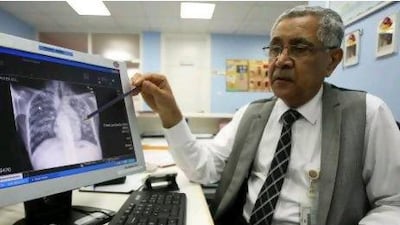Nearly two years after health officials recommended changing the law requiring expatriates with tuberculosis to be deported, no amendments have been made.
Speaking ahead of World Tuberculosis Day, which is today, doctors said discussions with the Ministry of Health (MoH) have been ongoing. They said the main issue was the deportation of cured patients whose lungs had scarring from the disease that showed up in X-rays.
"From a medical point of view, there is no problem with keeping those who only have a mark in their lungs, because they are not infectious," said Dr Mirza Al Sayegh, a consultant physician with the Dubai Health Authority (DHA) and the head of the Emirates Respiratory Society.
"We have discussed this with the Ministry of Health and immigration a long time ago, but until now nothing has happened."
The ministry said it was not prepared to comment on the issue.
The prospect of the mandatory deportation policy being scrapped was raised following a meeting of officials from the MoH, DHA and the Health Authority-Abu Dhabi (HAAD) in June 2010 to unify guidelines for dealing with the disease.
The DHA's director of public health and safety at the time, Dr Ali Al Marzooqi, said after the meeting that there was agreement that the laws were outdated and drove cases underground.
"Everyone agrees," he said. "It is not unlikely that Dubai will change its rules and stop deporting people."
Dr Salim Abid, manager of public health and research at HAAD, said the authority would "welcome any change in the law ... Both in terms of follow-up for positive cases and the long-term future of these cases."
"There is no good reason why they should be deported," he said
However, no changes have been announced since then, and last year the UAE joined the GCC expatriate worker programme under which workers from 10 Asian and African countries must be screened for infectious diseases before leaving their home countries. Even those found to have had TB but been cured are considered medically unfit and denied entry.
International institutions say this is discrimination.
"Anyone who had TB and has been treated properly is considered cured and should not be discriminated against," said Dr Mario Raviglione, the director of the Stop TB department at the World Health Organisation (WHO). "This becomes an issue of human rights."
The GCC policy has dashed the hopes of CM, from the Philippines, of finding a nursing job in the UAE.
She was diagnosed with TB two years ago but declared clear of the infection after a six-month course of treatment. However, her doctor warned her against applying for jobs in the GCC because she would be sent back the moment the authorities found out.
"At first, I didn't believe it," she said. "But after researching online and finding so many testimonials from people who have been deported, I realised it was true."
Now 23, CM has joined the fight to change regulations that prevent people like her from pursuing their ambitions. "I'm very active online on forums and opinion pages," she says. "I plan on sending decision makers a private message. This discrimination needs to end."
Dr Farida Al Hosani, the section head for communicable diseases at HAAD, said any change to the law must be approached with caution.
"We have a high influx of expatriates, and many of them are workers coming from countries that are endemic with the disease," she said. "You don't know that these people received proper treatment and are not likely to relapse. Of course we don't like to send people back home, but it is a challenge."
Some expatriates are hopeful that an exemption to the law may soon be granted for wives under their husband's sponsorship.
A 28-year-old Indian engineer with a construction company in Abu Dhabi was forced to send his wife of four months home after an X-ray showed a lesion on her lungs.
"The sputum and skin test were clear, and it was determined that she did not have the disease," he said. "But because of the mark that appeared in the X-ray, she was still asked to leave."
He is not alone: there are dozens of online forums dedicated to this cause.
An online petition has also been launched on change.org that already has the signatures of three representatives of the WHO.
One of the signatories is Lucica Ditiu, the executive secretary of the Stop TB Partnership, who said that a policy of deportation resulted in a false sense of protection.
"People are travelling all the time, so this approach creates an artificial barrier," she said. "A more effective method would be identifying these people quickly and treating them. They need to be given protection, support and understanding - not additionally burdening them by stigmatisation."
Open dialogue between patients and the authorities, and looking at the practices of other countries is the best way forward, Dr Ditiu said.
"There's no bad will from anyone. At the end this all comes from a strong desire to protect the population, which I understand," she said. "But there is more than one way to do this and we should choose the best one."

